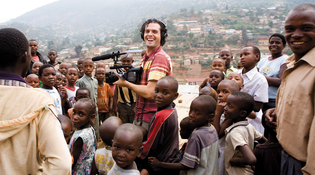 loading
loading
Arts & CultureConfronted by history Jonx PillemerMoved by a chance encounter in New Haven, Taylor Krauss ’02 is recording the stories of Rwandan genocide survivors. He hopes to donate the archive to Yale. View full image
“The one telling the stories was my dad. But they killed him and my siblings,” says a dark-skinned woman with braids and light-brown eyes. “That means if I keep it to myself, it will disappear forever.” She sings a song that she says her twin liked, before stopping and bowing her head. She’s not ready for that story. Instead, she explains that “they” set the church on fire and cut people with machetes. Her brother was killed in front of her, before she escaped. She ran down a hill, into men who cut down a woman who fell on top of her. “I couldn’t remove her,” she says. “I was full of her blood.” It’s not easy to listen to a survivor of genocide like Antoinette. But that’s what Taylor Krauss ’02 has been doing for the past five years, interviewing and filming Rwandans who survived the country’s 1994 massacre. The killing, mostly by Hutus targeting Tutsis and some moderate Hutus, lasted three months and left as many as one million Rwandans dead. In 2006, Krauss founded the Voices of Rwanda, a nonprofit organization that is collecting the testimonies of survivors for a video archive. Krauss ended up in Rwanda because of his tailor. During his senior year, as he was getting the zipper of his jacket fixed, the tailor mentioned that he’d been at the concentration camp at Dachau and that his testimony was recorded at Yale’s Fortunoff Video Archive for Holocaust Testimonies. Krauss’s cousin was also a survivor. Krauss went to the archive. “There I was, feeling the zipper on my jacket and recognizing that the same hands that had repaired my jacket were the ones that he talked about being smashed by the Nazis,” Krauss recalls. “I was confronted by history in a very different way. It demanded something of me personally.” He didn’t answer that demand immediately. After graduating, he moved to L.A., where he worked in television, and then New York, where he catalogued archival footage for a documentary with the acclaimed director Ken Burns. In 2004, Krauss joined Michael Kavanagh ’00, ’07MA, a radio journalist, in Rwanda to shoot a short film. When he was back in the States, Krauss kept returning to the Fortunoff collection, both for romantic reasons (the woman who is now his wife worked there) and for reasons he found unexplainable. Encouraged by the collection’s archivist and by the historian who heads Yale’s Genocide Studies program, he returned to Rwanda in 2005. He brought camera equipment and his savings, including his inheritance from his cousin’s share of Holocaust reparations. Since then, with a staff that has grown to seven Rwandans, he has listened to survivors—often for up to ten hours, once for three days. Krauss has yet to collect a paycheck. To make ends meet, he freelances in the region. He’s filmed silverback gorillas in eastern Congo; followed Scarlett Johansson in Rwanda for the nonprofit RED; and shadowed a Ugandan opposition leader, once witnessing a failed assassination attempt. His goal is a Voices of Rwanda archive at Yale. David Simon, a lecturer at Yale who specializes in Rwanda and is acting director of the Genocide Studies Program, believes the archive would complement Yale’s other collections. He adds, “It’s valuable not just for understanding the Rwandan genocide but for understanding life in Rwanda in a particular time and place.” So far, Krauss has collected 1,000 hours of testimonies, but he can’t keep up with the number of survivors who want to talk. For Antoinette’s part, she believes it is her duty to remember, even if it means retelling how her twin was cut down as she was singing her favorite hymn.
The comment period has expired.
|
|